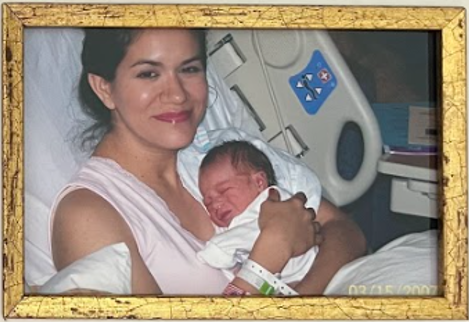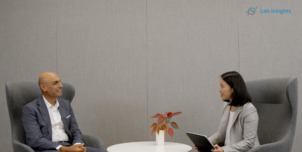With the advent of newborn screening tests (NBS) for Angelman syndrome, a rare genetic condition that causes serious neurodevelopmental challenges, patients and caregivers may soon have new tools for achieving early diagnosis [1]. The clinical utility and cost-effectiveness of these tests are still being evaluated [2], but they raise hope that more Angelman patients will benefit from proactive interventions.
Marina Leyba, a Subchapter Lead for R&D Internal Solutions Enablement at Roche Diagnostics, understands better than most the enormous difference that early detection can make. Her daughter, Bella, might have faced life in a wheelchair if it weren’t for Leyba’s determination and vigilance.
Bella’s diagnostic odyssey
Bella was born healthy, but during the first few months, Leyba couldn’t shake the feeling that something was wrong—even as everyone else, including Bella’s paediatrician, assumed it was just the usual anxiety of a first-time mother.
As the months passed, Leyba continued to observe worrying signs. Bella didn’t make eye contact with people, didn’t try to speak, and had abnormal muscle tone. Her daughter missed developmental milestones, prompting Leyba to put her into physical therapy. “My gut was telling me there was something going on here,” Leyba says.
The experience started Leyba on a diagnostic odyssey that is typical for many rare disease caregivers, and especially those with conditions that are not covered in standard methods for non-invasive prenatal testing and newborn screening. An initial battery of tests did not turn up anything, forcing Leyba to bounce around between various healthcare centres in a costly and emotionally draining quest to make sense of her daughter’s symptoms.
Finally, when Bella was about 11 months old, a neurologist realised that she was having seizures and recommended genetic testing. Just shy of her first birthday, Bella was diagnosed with Angelman syndrome, a rare neurological disorder characterised by developmental delays, learning disabilities, the absence of speech and motor issues, among other issues.
The benefits of early diagnosis
Without routine prenatal or newborn screening for Angelman syndrome, children with the condition typically aren’t diagnosed for years and are sometimes misdiagnosed with cerebral palsy and other disorders. Without the benefit of special therapy, they may never speak or walk.
With the diagnosis, Bella was eligible for all the therapy she needed, including occupational, speech and physical therapy. And because Leyba had gotten her started on some of this therapy even before the diagnosis was made, Bella’s prognosis was significantly better than for most kids with Angelman syndrome. She began walking at age 4 and was able to develop fine motor skills that many with her diagnosis never can.
“Those are critical years for speech and neurological connections that are developing,” Leyba says. “We’re grateful that we got the help early, but the system isn’t set up that way. Many families do not find out until their kids are well past these critical years.”
Looking back, Leyba wishes she could have known about the diagnosis much earlier. Not only would an earlier diagnosis have pointed the way to what Bella needed, but it would also have let her skip so many unnecessary tests that failed to generate answers.
“The diagnosis gives you information, it gives you your path,” she says. “Knowing it earlier would have prepared me to make better decisions for her and to seek out the best medical care and resources.”
Hope and action
The diagnosis also helped Leyba and her husband in another way: their decision to have more children. Angelman syndrome is caused by a spontaneous deletion, rather than an inherited variant, so the couple had no increased risk of having more kids with the same diagnosis. They went on to have two boys, both healthy.
After Bella’s diagnosis, Leyba also left her career in the aerospace field and joined Roche so she could help make sure other families get the diagnostic tests they need to stay as healthy as they can. Today she is an advocate for expanded newborn screening and other tools that would give families information as soon as possible.
“The earlier you can get the diagnosis, the better the outcome for the child,” she says. “I’m a firm believer that knowledge is power.”
References:
[1] Should newborn screening include chromosome 15q disorders? Access at: https://www.labinsights.com/get-inspired/content/should-newborn-screening-include-chromosome-15q-disorders
[2] How Early Check shapes newborn screening policy with better evidence. Access at: https://www.labinsights.com/get-inspired/content/how-early-check-shapes-newborn-screening-policy-better-evidence






